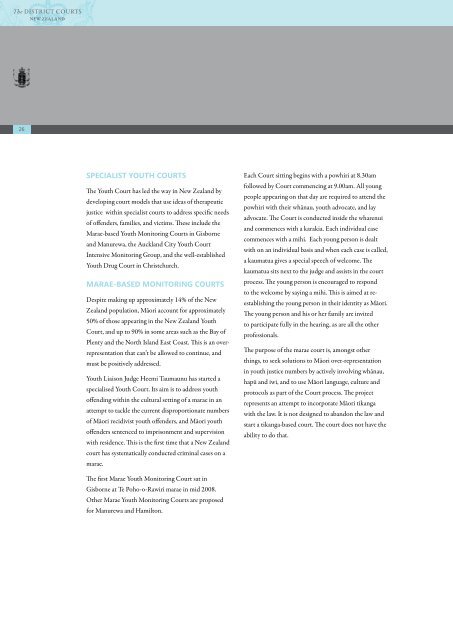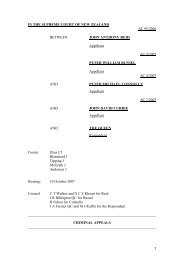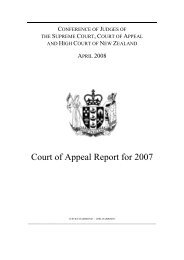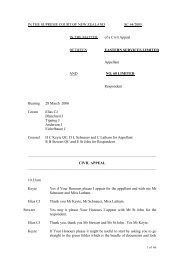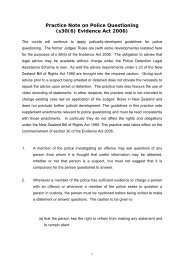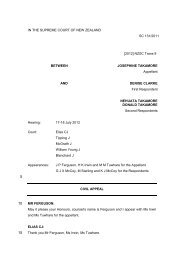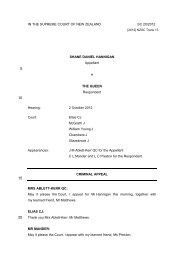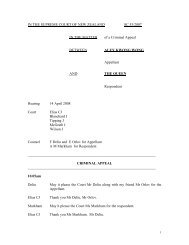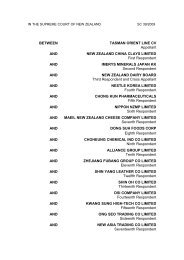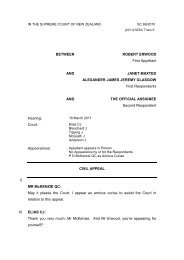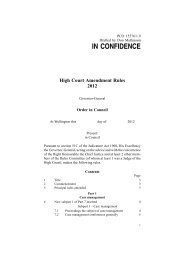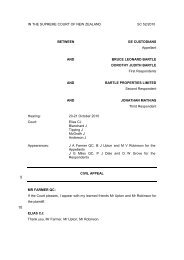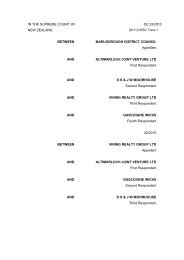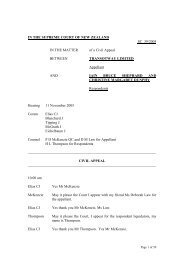DISTRICT COURTS - Courts of New Zealand
DISTRICT COURTS - Courts of New Zealand
DISTRICT COURTS - Courts of New Zealand
Create successful ePaper yourself
Turn your PDF publications into a flip-book with our unique Google optimized e-Paper software.
The <strong>DISTRICT</strong> <strong>COURTS</strong><br />
NEW ZEALAND<br />
26<br />
Specialist Youth <strong>Courts</strong><br />
The Youth Court has led the way in <strong>New</strong> <strong>Zealand</strong> by<br />
developing court models that use ideas <strong>of</strong> therapeutic<br />
justice within specialist courts to address specific needs<br />
<strong>of</strong> <strong>of</strong>fenders, families, and victims. These include the<br />
Marae-based Youth Monitoring <strong>Courts</strong> in Gisborne<br />
and Manurewa, the Auckland City Youth Court<br />
Intensive Monitoring Group, and the well-established<br />
Youth Drug Court in Christchurch.<br />
Marae-based Monitoring <strong>Courts</strong><br />
Despite making up approximately 14% <strong>of</strong> the <strong>New</strong><br />
<strong>Zealand</strong> population, Māori account for approximately<br />
50% <strong>of</strong> those appearing in the <strong>New</strong> <strong>Zealand</strong> Youth<br />
Court, and up to 90% in some areas such as the Bay <strong>of</strong><br />
Plenty and the North Island East Coast. This is an overrepresentation<br />
that can’t be allowed to continue, and<br />
must be positively addressed.<br />
Youth Liaison Judge Heemi Taumaunu has started a<br />
specialised Youth Court. Its aim is to address youth<br />
<strong>of</strong>fending within the cultural setting <strong>of</strong> a marae in an<br />
attempt to tackle the current disproportionate numbers<br />
<strong>of</strong> Māori recidivist youth <strong>of</strong>fenders, and Māori youth<br />
<strong>of</strong>fenders sentenced to imprisonment and supervision<br />
with residence. This is the first time that a <strong>New</strong> <strong>Zealand</strong><br />
court has systematically conducted criminal cases on a<br />
marae.<br />
Each Court sitting begins with a powhiri at 8.30am<br />
followed by Court commencing at 9.00am. All young<br />
people appearing on that day are required to attend the<br />
powhiri with their whānau, youth advocate, and lay<br />
advocate. The Court is conducted inside the wharenui<br />
and commences with a karakia. Each individual case<br />
commences with a mihi. Each young person is dealt<br />
with on an individual basis and when each case is called,<br />
a kaumatua gives a special speech <strong>of</strong> welcome. The<br />
kaumatua sits next to the judge and assists in the court<br />
process. The young person is encouraged to respond<br />
to the welcome by saying a mihi. This is aimed at reestablishing<br />
the young person in their identity as Māori.<br />
The young person and his or her family are invited<br />
to participate fully in the hearing, as are all the other<br />
pr<strong>of</strong>essionals.<br />
The purpose <strong>of</strong> the marae court is, amongst other<br />
things, to seek solutions to Māori over-representation<br />
in youth justice numbers by actively involving whānau,<br />
hapū and iwi, and to use Māori language, culture and<br />
protocols as part <strong>of</strong> the Court process. The project<br />
represents an attempt to incorporate Māori tikanga<br />
with the law. It is not designed to abandon the law and<br />
start a tikanga-based court. The court does not have the<br />
ability to do that.<br />
The first Marae Youth Monitoring Court sat in<br />
Gisborne at Te Poho-o-Rawiri marae in mid 2008.<br />
Other Marae Youth Monitoring <strong>Courts</strong> are proposed<br />
for Manurewa and Hamilton.


